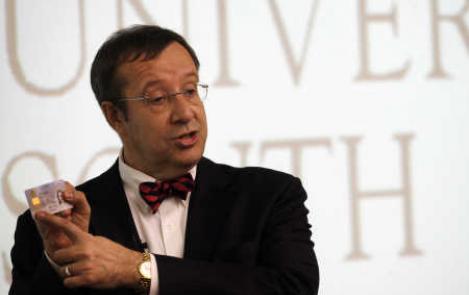-
Reset
+


"Internet, technology help Estonia's transformation", St. Petersburg Times, 21 April 2008
21.04.2008
By James Thorner, Times Staff Writer
TAMPA — When the Iron Curtain lifted in 1991, Estonia, an ex-Soviet republic twice the size of New Jersey, was lumbered with an antiquated economy straight out of the 1930s.
But by a happy coincidence, the country gained independence at the dawn of the Internet age. As Estonian President Toomas Hendrik Ilves told an audience Monday at the University of South Florida's College of Business, his countrymen plunged happily into cyberspace.
Look at the former Communist basket case today: Ninety-five percent of banking is done over the Web. Two Internet powerhouses — the Skype online phone network and the Kazaa file-sharing system — as well as the technology behind Baidu (the Chinese search engine) were invented by savvy Estonians.
Its citizens pay their 21 percent national flat tax online in a matter of minutes. Though bad news to the likes of H&R Block, Estonia, with its 1.3-million population, has little labor to spare for paperwork.
"We don't want thousands of people reading tax returns," Ilves, wearing a professorial bow tie, told a crowd of about 100 during a visit to Tampa.
Ilves was raised in the United States. His parents fled the Russian occupation of the Baltic nation in 1944 and Ilves eventually went to work for Radio Free Europe, the American-run, anti-Communist broadcasting service.
He renounced his U.S. citizenship to return to Estonia in the early 1990s and rose to become U.S. ambassador and foreign minister. In 2006, he was elected the country's president.
On a swing through Tampa before returning to Europe, Ilves outlined his country's success in the face of its not-always-friendly Russian neighbor. The country's economic output has risen to $20,300 per capita today from $702 per capita in 1992.
Its liberal business climate has attracted foreign investment like few other ex-Communist countries. Much of it comes from neighboring Finland. It joined the European Union in 2004, and its soldiers serve in Afghanistan and Iraq.
Ilves said EU membership is key for a tiny nation eager to tap the continent's half-billion consumers. Investors pouring across the Baltic Sea from Sweden and Finland have sparked a real estate boom.
If Ilves had any complaint, it's that his countrymen are a bit too shortsighted in their pursuit of gains.
"I'd like Estonians to calm down a bit," he said at the end of his hourlong session at USF. "We're still in this fighting mood all the time."
Link to the original article on the homepage of tampabay.com



